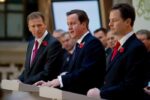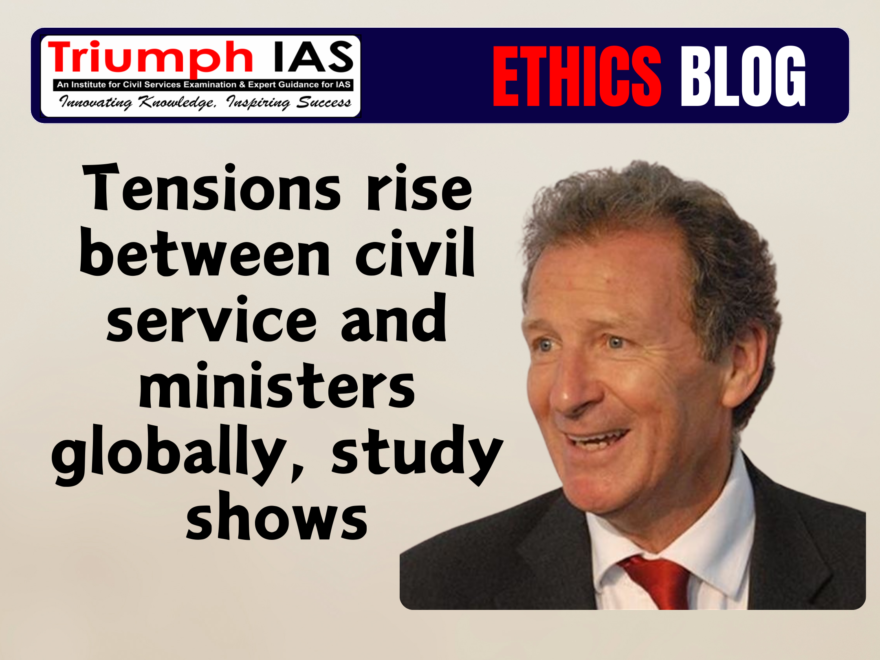Tensions rise between civil service and ministers globally, study shows
[Relevant for Public Ethics, Integrity and Aptitude]
Pressure to provide quick fixes makes it harder for officials to ‘speak truth to power’, says report

Civil servants around the world are increasingly suffering strained relationships with ministers as conflicts over providing quick-fix solutions and serving long-term national interests rise, research has found.
The leaders of the civil service, or its equivalent government system, in the UK, US, France, Australia, Canada, Singapore, Ireland, Estonia, Finland, Nigeria, Indonesia and Barbados were interviewed for a report by the Global Government Forum, published on Wednesday i.e 28th Aug 2024.
The study, led by former British cabinet secretary Lord Gus O’Donnell, who has served three prime ministers, identified several pressing areas afflicting civil servants globally. O’Donnell said he was “increasingly concerned that against the backdrop of rising populism and increasingly divisive politics, we are seeing weak leadership on vital issues of long-term importance”, such as climate change.
The research noted growing tensions between officials and ministers, making it harder to “speak truth to power”.
The senior officials also reported that colleagues felt increasingly torn between providing their political masters with short-term solutions and upholding their “stewardship” function as public servants working for their national long-term interest.
Global pressures, including post-Covid 19 economic recovery efforts, military conflicts, ageing populations and the “green transition” to cleaner energy systems, were also identified as challenges for civil services internationally.
PA, Cabinet secretaries and civil service chiefs reported struggles to recruit relevant talent to harness the opportunities of, and protect against the risks posed by, new technologies, particularly generative artificial intelligence.
Policymakers also faced structural barriers arising from the siloed way in which many governments are organised, as well as turmoil sparked by populism, extremism and misinformation, the study found.
The Global Government Forum, which publishes research and hosts events for officials internationally, identified five pillars central to creating a “modern, effective” civil service.
These included ensuring mutual respect and alignment between ministers and senior officials, achieved by better training and “safeguarding” the provision of impartial advice by civil servants, plus cultivating leaders who publicly defend officials.
Building a highly skilled public sector workforce — by overhauling recruitment and reducing reliance on external consultants — and fostering an “agile, digital and risk-taking culture focused on delivery” were identified as other core recommendations.
The final pillars were the implementation of working structures that transcend organisational silos, enhanced by a central authority that can oversee collaborative initiatives, and fostering a service trusted by its users and the public.
O’Donnell highlighted specific challenges that have beset officials in some countries, warning that the British civil service had recently “been victim to the ‘blob’ narrative” that portrays senior officials as a “consensus-seeking, self-perpetuating elite within the public sector”. The term became popular after being used by Michael Gove when he was Conservative education secretary. Sir Simon Case, UK cabinet secretary, has criticised the label as “dehumanising” and “insulting”.
O’Donnell also drew attention to the way in which a series of leading UK officials had been “publicly named and blamed for policy failures by the ministers they serve” in the past few years.
In 2022, the top civil servant at the Treasury was sacked in a bid to purge economic “orthodoxy” from government thinking, while in 2020 the chief civil servant at the Department for Education was dismissed in the wake of a row over school exam results in England. O’Donnell noted that in the US, swaths of impartial federal employees could be fired and replaced by political appointees under proposals put forward by Donald Trump, if the Republican presidential candidate wins the US election in November.

Four areas that can help:
- Establish a clear understanding of political objectives and civil service stewardship
- Implement training programmes for new ministers and political advisers
- Safeguard and reinforce the provision of impartial advice
- Cultivate leaders who actively defend civil servants in public forum

#EthicsBlogoTerms
Related Blogs …
 |
 |
Follow us :



Find More Blogs…
| Compare and contrast Karl Marx’s and Max weber’s | Karl Marx- Historical Materialism |
| Position of Women In the Modern Indian Society | Sociology: Social system and pattern variables |


